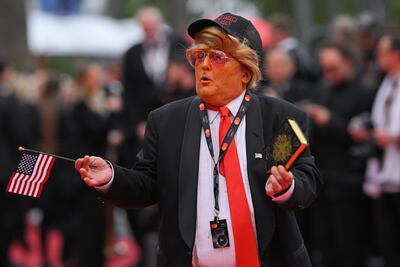Here’s a puzzle. 2024 is a year of elections worldwide, including the greatest democratic exercise ever attempted, in India. Just short of a billion Indian voters are taking part in the greatest election in human history. But this year’s EU elections, the UK general election and the US presidential election also raise a big question about democracy, and how we talk about politics.
Back in 2022, the London-based Political Studies Association reported that more British people were studying politics at school than ever before. Every student of politics learns about ideas as if they formed a horseshoe shape.
Centrist parties are in the middle, then on one side there are parties of the left, on the other, parties of the right. Left and right are supposed to have very different ideas on the role of the state, whether private enterprise is better than state-funded public works, taxation, and so on.
But the far left and far right – the two extremes of the horseshoe – start to come together because far or extreme-right political groupings have characteristics supposedly similar to those on the far or extreme left. These include contempt for democracy and the hankering for a “strong” leader who “breaks the rules”.
But how far do these categories and ideas make sense nowadays?
Across Europe, the EU elections run from June 3-9. There are fears in Germany, France, the Netherlands, Belgium and elsewhere of a far-right surge.

Last Sunday in Madrid, Spain’s far-right Vox Party brought together French opposition leader Marine Le Pen, Hungarian Prime Minister Viktor Orban, Italian Prime Minister Giorgia Meloni and Argentine President Javier Milei. They formed a common front against “massive illegal migration” and the supposed scourge of socialism. American hard-right figures who were present included Matt Schlapp from the American Conservative Union and Roger Severino, vice president of the Heritage Foundation, a right-wing think-tank.
Some dislike the “far right” badge, preferring to call themselves “centre right”, though others see that as rebranding, an attempt to claim to be more mainstream. Beyond arguing about definitions, more interesting is the way in which the responsibilities of government may – or may not – change things for those on the far or radical right once in power.
Ms Meloni, for example, bore the far-right label yet surprised some commentators by appearing to have governed pragmatically within the parameters of Italy’s democratic system. Others claim that Ms Meloni has not moved ideologically at all, but merely nods towards the centre of national politics while her party, Brothers of Italy, has echoes of Benito Mussolini’s fascists in the 1920s.
Either way, a fascinating April 2024 report from Carnegie Europe scholars wrote of the core upheaval in European politics: “For decades, the traditional mainstream parties of the centre right and centre left have been losing ground, while anti-establishment parties have been gaining support,” they noted.
“According to research by the University of Amsterdam, 32 per cent of voters opted for anti-establishment parties in 2021, up from 12 per cent in the early 1990s. Radical-right parties make up about half of this share, and their support has risen faster than that of any other group.”

This shake-up may become more obvious after the European elections. It has also had an impact in Britain, although its first-past-the-post election system tends to punish those outside the political mainstream. Those on the nationalist right, including the UK Independence Party, the Brexit Party and its latest incarnation, Reform UK, have won votes and changed politics but have yet to alter the predominantly two-party system.
Moreover, the British Conservative party is a pragmatic shapeshifter. It has moved significantly towards the right, although its failure in this is worth examining. With hugely unpopular prime ministers, notably Liz Truss followed by Rishi Sunak, traditional Conservatives complain that courting the radical right means substituting ideology for pragmatism.
Pragmatism has always been a key moderate Conservative party selling point. And so, when it comes to politics and the rise of the far right, it’s worth considering not ideology but psychology. Voters across Europe – and as Donald Trump showed, also in the US – always grow tired of “politics as usual”.
Humans are always looking out for the shiny new thing, the golden key to unlock a solution to all our problems. Most of us don’t care much about ideology. Most of us don’t fret about labels of left or right or radical. Most of us merely hope for competence. Since things usually go wrong with governments eventually, voters will always have an inescapable desire for change.
All the parties I have mentioned that have been called far right or radical right have indeed been increasing in popularity. But complaining about things, as they are, is easy. So is pretending, when in opposition during hard times, that you have the solution sometime in the future – but not right now – to the world’s problems.
Governing is difficult. If you don’t believe me, ask the British Conservatives.


